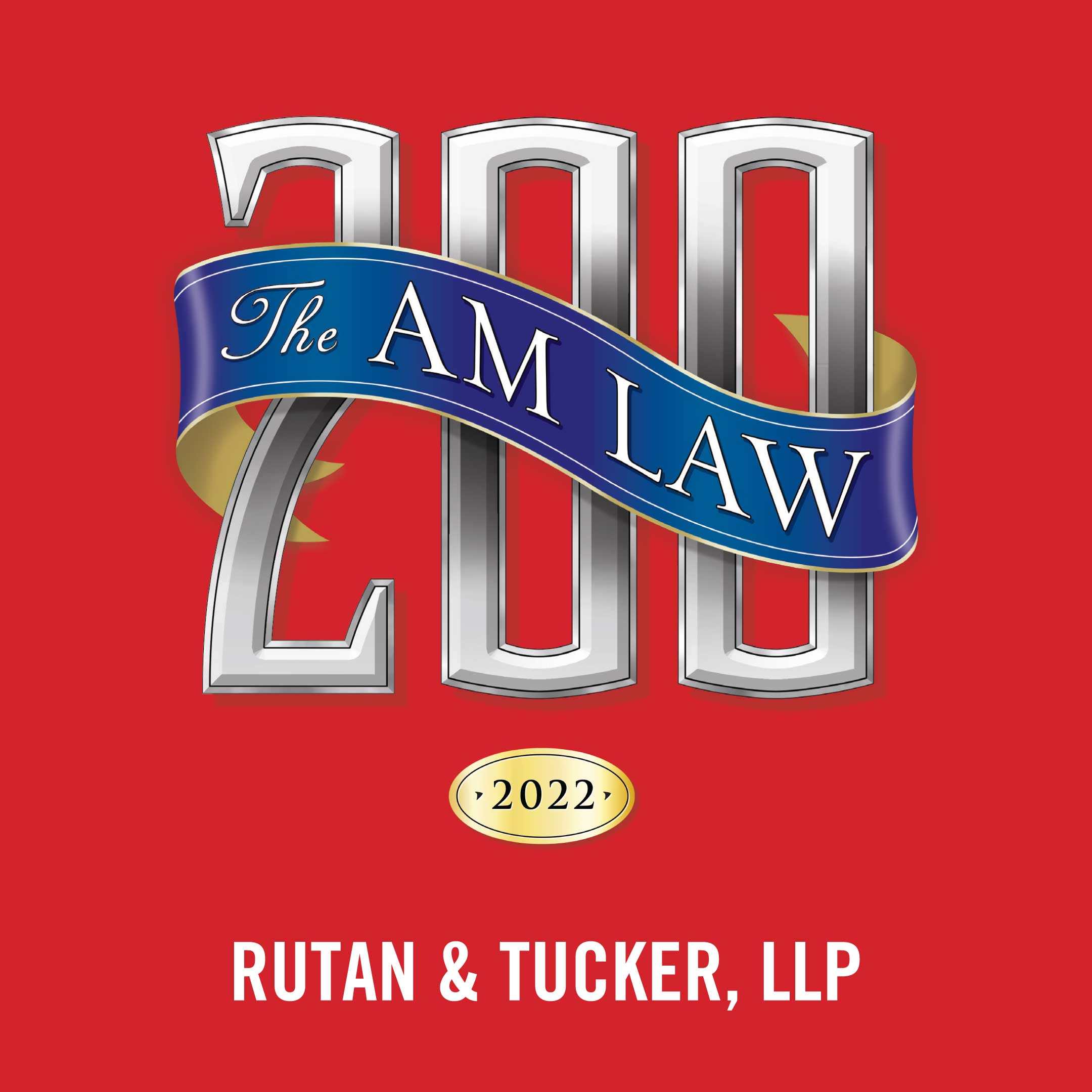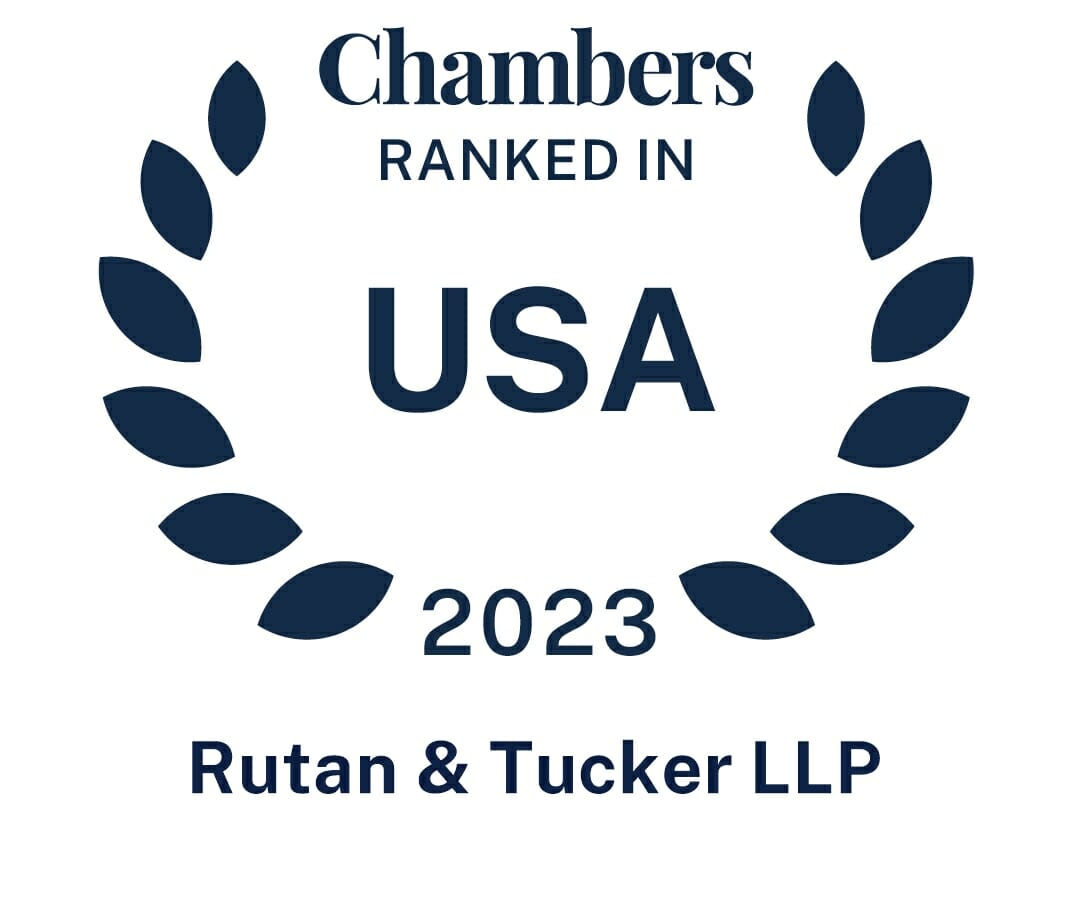Rutan & Tucker has been one of California’s leading firms in eminent domain, inverse condemnation and property valuation law over the past 50 years, in large part because of the quality and experience of its attorneys. We have represented both property owners and public agencies in eminent domain and inverse condemnation actions, and also has a wealth of experience in property valuation related to property tax appeals, lease renewals, estate controversies and partnership disputes. With this thorough understanding of both the public and private sides, we are able to provide clients with a strategic advantage over firms that represent only public agencies or property owners. Further, our broad experience in public agency, land use, environmental and natural resource law adds to the depth of expertise it can bring to bear on property valuation cases, and helps attorneys devise creative strategies that can make the difference between success and failure.
Team
Overview
Our attorneys have handled more than 2,000 eminent domain and property valuation matters. These have included cases involving freeway and road projects, city halls and other government buildings, schools, golf courses, public utility facilities, dams and water projects, natural gas pipelines, oil drilling projects, redevelopment projects, professional sports stadiums and extra-territorial acquisitions. Types of property have included hotels, restaurants, office buildings, shopping centers, residences, gas stations, commercial and industrial buildings, farms and citrus groves, car dealerships and auto wrecking yards, billboards, mines, radio towers and contaminated real estate, as well as mineral rights, leaseholds, possessory interests, easements and restrictive covenants.
Our attorneys have dealt with such issues as challenges to the right to take, challenges to environmental review and mitigation, claims for unreasonable delay or unreasonable conduct by a public agency, the effect of toxic contamination on property value, disputes over the highest and best use of a property, claims for loss of business goodwill, severance damages and relocation benefits, and claims that a proposed use is not a valid public use.
HOW WE CAN HELP YOU
Eminent domain and property valuation law bridges many traditional divides: litigation and transaction law; public agencies and private owners; established precedents and creative solutions. It is a dynamic and complex area in which each case has its own unique set of challenges. There is no substitute for the breadth of experience and resources that Rutan & Tucker attorneys can put to use for you.
THE EMINENT DOMAIN PROCESS
Eminent Domain is the power of a public agency, under both the United States Constitution and the California Constitution, to acquire private property for a public use subject to the requirement that the public agency pay “just compensation” for the property. The power of eminent domain is often used to acquire property that is necessary for a public project when the public agency and the owner cannot agree upon the value of the property or when the owner does not want to sell the property under any circumstances. The power of eminent domain may be exercised to acquire property for a particular use only by a public agency or person authorized by a statute to exercise the power of eminent domain for that use.
Just Compensation includes the fair market value of the real property and improvements being taken as well as any fixtures and equipment. It also includes the diminution in value of the remaining real property and improvements when the property taken is part of a larger parcel (“severance damages”), and loss of business goodwill for any business that is located on the property being taken or on the larger parcel. Occupants of the property may also be entitled to relocation assistance.
A condemnation action resolves the differences between the property owner and the public agency over how much should be paid as just compensation. Both the owner and the public agency are entitled to request a jury trial to determine just compensation. However, any objections the property owner has to the public agency’s right to take the property are determined by the judge, not the jury. The costs of the condemnation procedure (such as filing fees, jury fees, process service fees) are required to be paid by the public agency; however, the property owner is required to pay his or her own attorneys fees and other litigation costs. Under some circumstances, when the court determines that the public agency’s pretrial offer of just compensation was unreasonable and the property owner’s demand was reasonable, the court has discretion to order the public agency to pay all or part of the property owner’s attorneys fees and litigation costs.
Before a public agency may acquire property by eminent domain, it must engage in good faith negotiations with the owner to purchase the property and is required to appraise the property, establish what it believes to be just compensation based upon the appraisal, make an offer to acquire the property for the full amount of the established just compensation, and provide the owner a detailed summary of the basis for the offer. If negotiations fail, the next pre-requisite to a condemnation action is the adoption by the governing body of the public agency of a Resolution of Necessity which requires a 2/3 vote of all members, whether present or not. This requires a noticed hearing at which the governing body determines whether it can make findings that the project is necessary, that the project is planned and located in a manner that is most compatible with the greatest public good and the least private injury, and that the property is necessary for the project. Once the public agency adopts a resolution of necessity and makes these findings, a court will not overturn the public agency’s findings on necessity unless the property owner can show there was fraud or a gross abuse of discretion. The public agency must also make findings to comply with the California Environmental Quality Act for the underlying project at the time it determines to condemn the property. The location, purpose and extent of the acquisition must conform to the adopted general plan and, for most acquisitions, the responsible planning agency must report on this conformity prior to filing the condemnation action.
The public agency may file a condemnation action after the adoption of a resolution of necessity and, if the public agency deposits with the court the amount its appraiser has determined to be just compensation, the public agency may apply for an order for prejudgment possession. If the court issues the order for prejudgment possession, the public agency may take immediate possession of the property and begin construction on the property within 3 to 90 days after service of the order on the property owner and the occupants of the property, even though a trial has not yet been held. Either party is entitled to have a jury determine the ultimate just compensation to be awarded.
Experience
REPRESENTATIVE MATTERS:
ANAHEIM RESORT AREA BEAUTIFICATION AND STREET WIDENING
Representation of Anaheim in Multi-Year Series of Acquisitions to Create an Anaheim Resort Area Identity. Since the mid 1990s we have represented Anaheim in a series of projects to help create an Anaheim Resort Area identity for the area around Disneyland, through street widenings, undergrounding of utilities, and creation of a unified streetscape and landscaping theme. The projects (still ongoing) have involved more than 100 part takes along Harbor Boulevard, Katella Avenue, Ball Road, Lincoln Avenue, Euclid Avenue, and other major thoroughfares in Anaheim. The projects include oversight and administration of all aspects of the acquisition process, from title work to litigation. The diverse nature of the properties taken have raised the full range of eminent domain issues, including soil contamination, goodwill analyses, obtaining alternative access, and directing condemnees through nonconforming use and sign abatement problems created by the public acquisitions. Defendants have included Chevron, Arco, 7-Eleven, McDonald’s, major hotels, Hertz, Southern California Edison, and other major corporate entities, as well as a host of small businesses.
CITY OF SAN DIEGO V. RANCHO PENASQUITOS PARTNERSHIP, ET AL., SAN DIEGO SUPERIOR COURT CASE NO. 735816
Representation of Property Owners in Path of Freeway Project. San Diego sought to acquire our client’s property (approximately 11 acres) for the State Route 56 freeway linking the I-5 and I-15 freeways in the northern part of the city. The city offered only $120,000 per acre (notwithstanding the fact that other nearby properties were selling for $300,000 per acre) on the grounds that, according to the city, our clients’ property could not be upzoned like the other nearby properties in the absence of the freeway. The city also argued that our clients should not be entitled to recover “severance damages” to their remainder property, because the freeway would somehow benefit our clients’ remainder property (to the tune of over $11 million). After a three-week jury trial, the jury returned a verdict in favor of our clients in the total amount of $3.9 million, which included $2.87 million (or $268,000 per acre) for the value of the part taken and more than $1 million in severance damages. The jury verdict in this case caused the city to settle the companion condemnation case (involving property owned by a different client) for more than $6.5 million. We are currently representing several other property owners whose properties are being condemned for the remaining stretch of State Route 56.
SIGNAL HILL REDEVELOPMENT AGENCY V. B.J. HUGHES, D.P. INVESTMENTS, ET AL., LOS ANGELES SUPERIOR COURT CASE NOS. C706123 AND C706122
Representation of Redevelopment Agency in Acquisition and Valuation of Contaminated Properties. We represented the Signal Hill Redevelopment Agency in a series of cases to condemn industrial/manufacturing properties for a redevelopment project. The cases involved novel issues relating to the acquisition and valuation of real estate contaminated with toxic materials and required significant interaction with the local Regional Water Quality Control Board in connection with its enforcement practices and their effect on property values. After pretrial proceedings challenging the Agency’s right to offset clean-up costs against the fair market value of the property being taken, the cases were all resolved with the owners being required to pay the bulk of the clean-up costs.
CITY OF CARLSBAD V. BECKMAN INSTRUMENTS
Successful Representation of Property Owner Opposing Condemnation. We represented the owner of 25 acres of vacant land sought to be acquired by Carlsbad. At the time of the city’s pre-condemnation offer to acquire the property, Beckman Instruments was in escrow to sell the property for approximately $2 million more than the city offered. After we prevailed in a writ of mandate lawsuit against Carlsbad challenging the city’s compliance with CEQA environmental review requirements (Beckman Instruments v City of Carlsbad, et al., San Diego County Superior Court No. NO75252) and after negotiations concerning the appropriateness of the project and the condemnation, the city abandoned efforts to acquire the property.
NEWPORT BEACH V. ARMSTRONG PETROLEUM CORP., ORANGE COUNTY SUPERIOR COURT CASE NOS. 35-79-89, 35-58-16 AND 34-87-83
Extra-territorial Condemnation of Surface Oil Drilling Sites for Newport Beach. We represented Newport Beach in this extra-territorial eminent domain case and its companion breach of contract case to compel Armstrong to assign to the city surface locations outside city boundaries for oil wells which were slant drilled beneath Newport Beach to the city-owned tidelands area. The surface locations were indispensable to the recovery of tidelands oil resources worth in excess of $50 million to the city. Oil wells were operated by Armstrong on the surface sites that Armstrong leased from third parties. Armstrong had historically used the wells to extract city-owned tideland oil pursuant to operating agreements. Upon the expiration of the operating agreements a dispute developed as to whether Armstrong was required to assign the surface site leases to the city, and the city initiated an eminent domain action to condemn the surface drilling sites so that it could operate the oil wells from those sites. The court ordered Armstrong to assign the sites to the city and to pay Newport Beach’s legal fees and costs.
STATE V. CINNAMON HOLLOW HOMEOWNERS’ ASSOCIATION
Obtained Settlement for Condominium Owners Six Times Caltrans’ Original Offer. In this case, the state acquired small portions of a condominium complex common area, to accommodate the Santa Ana (I-5) Freeway widening. We represented the homeowners’ association, which was the designated agent for the owners under the CCRs, though the owners still held common title to the condemned land. The representation required continuous coordination of the 85 individual owners, negotiation with Caltrans of site improvements to lessen project impacts, and ultimate compensation issues. The matter settled with Caltrans paying $1.7 million dollars, up from an original offer of less than $300,000.
CITY OF PALM SPRINGS – MID-VALLEY ARTERIAL
Acquisition of Indian Trust Properties. This project involved acquisition of some 13 properties for a major roadway construction in the Coachella Valley, 11 of which were Indian trust properties. The project required coordination of both Palm Springs and Cathedral City right-of-way staffs, in addition to coordination with the Coachella Valley Association of Governments (CVAG).
REDEVELOPMENT AGENCY OF THE CITY OF RIVERSIDE V. GRACAL CORPORATION, ET AL. RCSC CASE NO. RIC 385136
Represented the lessor of a portion of the Riverside Plaza Shopping Center in a condemnation action brought by the Redevelopment Agency. Our client had an unfavorable lease with a remaining term of 58 years under which the annual rent was only $10,000 per year. The Agency’s pre-condemnation offer was $183,000 based upon the present value of the right to receive the $10,000/yr rent and the discounted value of the right to the reversion (the right to get the land back in 2060). We settled the case after mediation proceedings with our client receiving compensation of $1,600,000.
CITY OF IRVINE — JAMBOREE ROAD WIDENING ACTIONS
Major Road Widening Project for City. We have represented the city of Irvine in approximately 24 cases involving acquisitions to widen Jamboree Road, one of the major roadways in Irvine. We trained the city’s in-house right-of-way agents, negotiated extensively with The Irvine Company regarding resolution of land use restrictions and CC&R enforcement mechanisms, and negotiated a form “Joint Use Agreement” for utility easements and relocations.
STATE V. SCHUMACHER TRUST, ORANGE COUNTY SUPERIOR COURT CASE NOS. 755626, 755628, 755629.
Unreasonable Pre-condemnation Conduct/Delay Case Against Caltrans. We represented the owner of a 4.5-acre strip of multi-tenant industrial/quasi-commercial units in Orange adjacent to the Santa Ana Freeway in a complete take by the state for the widening of the freeway. After the court granted our motion for summary adjudication of issues — which alleged the state had engaged in unreasonable pre-condemnation conduct and delays — the state agreed to pay our client pre-condemnation damages of $1,115,000 plus interest (over and above the compensation for the property taken).
STATE DEPARTMENT OF TRANSPORTATION V. SKATE RANCH, ORANGE COUNTY SUPERIOR COURT CASE NO. 38-15-19.
Representation of Business Owner in Freeway Widening Case — Attorney Fees and Costs Recovered. We represented the owner of a roller skating rink in a condemnation action filed by the state for a freeway overpass project. The state’s pretrial offer was $450,000.00. After a jury trial, the state agreed to settle by paying more than $3,200,000 including all attorneys fees and litigation costs incurred by the owner.
CITY OF LA QUINTA — JEFFERSON STREET WIDENING PROJECT
Oversight of Acquisition of Multi-Jurisdictional Rights of Way. We represented the city of La Quinta, which was the project manager on some 12 acquisitions for the widening and improvement of Jefferson Street, over portions of both La Quinta and Indio. The acquisitions entailed relocation of residents, coordination of takings with private, ongoing development approval processes, development of joint use arrangements with the Coachella Valley Water District, and project administration and coordination issues with CVAG and the City of Indio.

 Email
Email
 vCard
vCard












